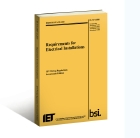The third amendment

A new update to the UK Wiring Regulations is now in place (the third amendment), meaning that the nation’s 100 000 electrical contractors have until 1 July to get up to speed with the latest changes. Russell Coleman explains the importance of compliance.
Electricity management systems form a crucial role in modern building design, yet are constantly in flux. Just as manufacturers continue to develop new products that rely on electricity, contractors must also adapt to the changing demands placed on a building’s electrical infrastructure.
Since 1982, the IET (previously IEE) has been responsible for determining BS 7671, the British Standard relating to requirements for electrical installations. These Wiring Regulations are so comprehensive that they are the benchmark for many other countries around the world.
Electricians need to be certified by City & Guilds to work on electrical installations. Regulations are regularly updated, and electricians currently use the 17th Edition, which was first published in 2008.
Even within these existing guidelines, amendments are deemed necessary to bring best practice into line with the ever-faster pace of changing technological demands. The latest update (17th Edition Amendment 3) was drafted during 2014 and came into effect from 5 January 2015. This means we are currently in a period of transition, during which all electrical contractors must get up to speed with the changes. By 1 July 2015, Amendment 3 will become the definitive standard of Wiring Regulations.
So what is changing?
Several new regulations are coming into force, as summarised below.
• The requirements to install insulation monitoring devices
• A prohibition on the interconnection of units with different power-supply systems
• The interconnection of different earthing systems, unless special precautions have been taken
• Requirements for installers where the generating set may operate in parallel with other sources.
These regulations will have a significant impact on electrical contractors, fundamentally changing best practice by giving them new dos and don’ts — whether that involves ensuring that an automatic disconnection of the supply is provided in the case of a first fault, or an RCD, or understanding what is permitted on electrical installations.
Other new requirements include the following.
• Protection against electric shock
• Methods of support of wiring systems in escape routes
• Additional protection for low-voltage wiring running through locations containing a bath or shower.

Of particular interest is a new requirement for switchgear assemblies, including consumer units installed in domestic premises, to have their enclosure manufactured from non-combustible material. The implication of this change will be that most consumer units in domestic premises will be metallic.
Amendment 3 cannot be ignored. Nonetheless, there are two obvious questions which can be often glossed over by contractors, who might prefer to concentrate on paid work rather than study new information. Those questions are, ‘Why?’ and, ‘How?’
The why is simple — it isn’t worth the risk. In the event of, for example, an electrical fire, an investigator will undoubtedly check whether recent wiring work was conducted by a qualified practitioner. Any failure in compliance could then be seized on by the Health & Safety Executive and contractors charged potentially with corporate negligence or (if the fire was fatal) corporate manslaughter.
This risk isn’t limited to building contractors. Every suitably large operator, from facilities management specialists through to telephone or utility suppliers, employ dozens or even hundreds of electricians — all of whom must be compliant.
The next question is how to secure compliance?
Officially, every electrician should buy a copy of BS 7671:2008, incorporating Amendment 3. This is a thick, yellow-coloured book costing £78. It is then up to the contractor to read and digest the contents. Understandably this might not be the most appealing solution, although it is also reasonably easy to find documents online that summarise the changes and focus on their essentials.
Even so, this needn’t be the most effective way of complying. Skim-reading a summary is no guarantee that the information will be properly understood or remembered. Importantly, too, there is no proof of compliance.
For that reason, we would always recommend that electricians attend a one-day workshop that provides practical, experiential means of learning the updates in Amendment 3.
There are many benefits to such an approach. For larger contractors, it becomes possible to save on economies of scale by having multiple electricians take the course at the same time.
Further, reputable trainers will have thoroughly digested Amendment 3, giving them a head-start in determining the optimum teaching methods with which to share their knowledge. For example, qualified trainers might illustrate the changes using actual equipment, enhancing the opportunities for the delegate to retain the required knowledge.
Finally, a reputable training provider should also provide a degree of evaluation. While there is no requirement for formal certification, an electrician who takes and passes a short multi-choice test at the end of a one-day workshop will have an additional proof of competency and reassurance that they have done enough to comply with the Wiring Regulations.
In short, while 17th Edition Amendment 3 sounds daunting, electrical contractors can get up to speed in a cost-effective, value-added and practical manner by undertaking reputable training.
Russell Coleman is Business Development Director at Develop Training
For details of Develop Training’s one-day workshops for 17th Edition Amendment 3, visit the link below.







